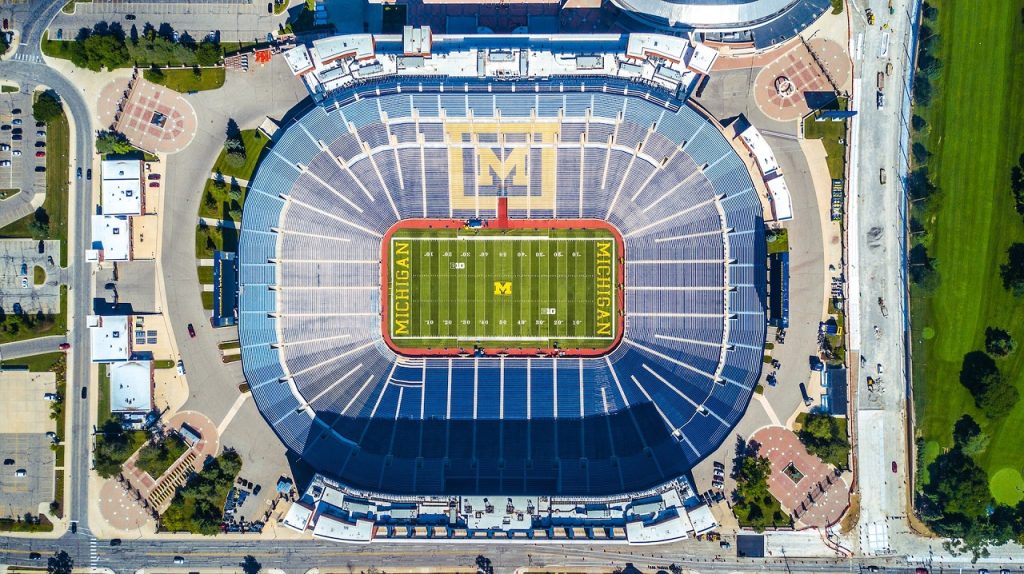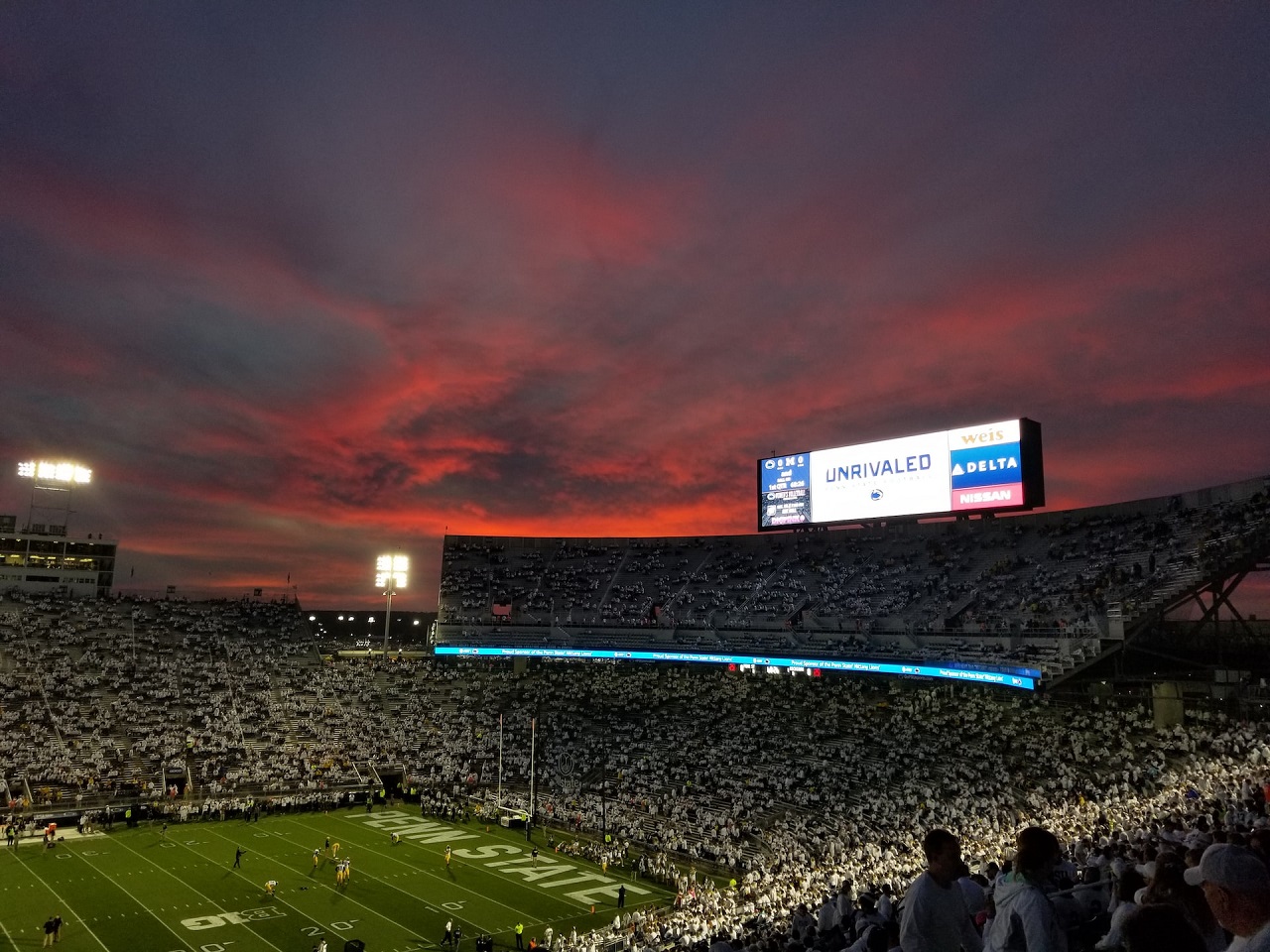Exploring the Largest and Most Iconic College Football Stadiums in the Country
As the most popular sport in America, college football draws huge crowds, with stadiums packed with passionate fans cheering on their favorite teams. With so much enthusiasm surrounding the sport, it’s no surprise that some of the largest stadiums in the world are found on college campuses across the country. Here is a comprehensive guide to the biggest college football stadiums in the United States.
Michigan Stadium (Ann Arbor, MI)
Michigan Stadium, also known as “The Big House,” is the largest college football stadium in the country, with a seating capacity of 107,601. The stadium was built in 1927 and has undergone several renovations over the years to increase its size and modernize its facilities. Home to the University of Michigan Wolverines, the stadium has been the site of numerous historic games and is known for its electrifying atmosphere.

Beaver Stadium (State College, PA)
Beaver Stadium is the second-largest college football stadium in the country, with a seating capacity of 106,572. Home to the Penn State Nittany Lions, the stadium has a rich history and has been the site of many memorable games. The stadium’s unique shape and design create a powerful, intimidating atmosphere that can be overwhelming for visiting teams.
Ohio Stadium (Columbus, OH)
Ohio Stadium, also known as “The Horseshoe,” is the third-largest college football stadium in the country, with a seating capacity of 102,780. Home to the Ohio State Buckeyes, the stadium is one of the most iconic and recognizable in the country, with a unique design and impressive history. The stadium’s size and energy make it a daunting venue for any visiting team.
Kyle Field (College Station, TX)
Kyle Field is the fourth-largest college football stadium in the country, with a seating capacity of 102,733. Home to the Texas A&M Aggies, the stadium is known for its raucous atmosphere and passionate fans. The stadium’s recent renovations have only increased its already impressive size and amenities, making it one of the premier venues in the country.
H1: Neyland Stadium (Knoxville, TN) Neyland Stadium is the fifth-largest college football stadium in the country, with a seating capacity of 102,455. Home to the Tennessee Volunteers, the stadium is known for its stunning architecture and breathtaking views of the surrounding mountains. With a rich history and passionate fan base, Neyland Stadium is one of the most beloved venues in the country.
Other Notable Stadiums
While the above stadiums are the largest in the country, there are many other notable college football stadiums that deserve mention. These include:
Bryant-Denny Stadium (Tuscaloosa, AL)
Home to the Alabama Crimson Tide, Bryant-Denny Stadium has a seating capacity of 101,821 and is known for its passionate fan base and electric atmosphere.
Darrell K Royal-Texas Memorial Stadium (Austin, TX)
Home to the Texas Longhorns, Darrell K Royal-Texas Memorial Stadium has a seating capacity of 100,119 and is known for its unique design and impressive amenities.
Tiger Stadium (Baton Rouge, LA)
Home to the LSU Tigers, Tiger Stadium has a seating capacity of 102,321 and is known for its rowdy, passionate fans and electrifying atmosphere.
Sanford Stadium (Athens, GA)
Home to the Georgia Bulldogs, Sanford Stadium has a seating capacity of 92,746 and is known for its historic architecture and picturesque setting.
Memorial Stadium (Lincoln, NE)

Home to the Nebraska Cornhuskers, Memorial Stadium has a seating capacity of 90,000 and is known for its passionate fan base and longstanding tradition of excellence.
What Makes a Great Football Stadium?
There are many factors that contribute to the greatness of a college football stadium. Size, of course, is a major consideration, as larger stadiums are able to accommodate more fans and create a more electrifying atmosphere. However, other factors such as architecture, amenities, and location can also make a significant impact.
For example, stadiums with unique designs or stunning views can create a memorable experience for fans, while those with state-of-the-art facilities and modern amenities can enhance the overall game-day experience. Additionally, stadiums located in college towns or scenic areas can provide a special charm that cannot be found in larger cities.
The Importance of College Football Stadiums
College football stadiums are not just places to watch a game – they are often the center of a university’s culture and identity. A great stadium can bring together alumni, students, and fans from all walks of life, creating a sense of community and pride. Additionally, the economic impact of a college football stadium can be significant, as it can attract visitors from all over the country and generate millions of dollars in revenue.
In summary, college football stadiums are some of the largest and most impressive venues in the world, with a rich history and passionate fan base. Whether it’s the massive size of Michigan Stadium, the unique shape of Ohio Stadium, or the stunning views of Neyland Stadium, each stadium has its own unique qualities that make it special. Regardless of which stadium you visit, you are sure to have an unforgettable experience that captures the excitement and energy of college football.

